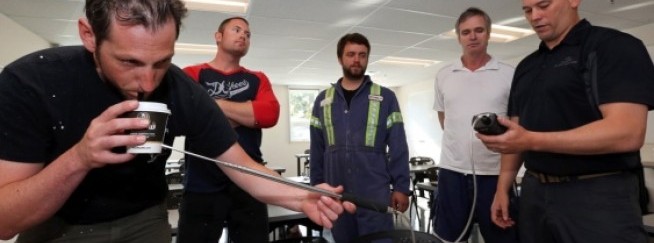Sun rising on shipbuilding industry, says Victoria-based marine research centre
Source: Times Colonist
Author: Carla Wilson
Published Date: July 31, 2013
B.C. shipyards have the capability to build three new B.C. ferries, although it may require a joint effort among companies, says the head of the new marine training centre in Esquimalt.
“I don’t think, for instance, a smaller yard might be able to take on the whole contract by itself. It might have to band together with a couple of other yards to do that,” Alex Rueben, executive director of the Industrial Marine Training and Applied Research Centre, said Tuesday.
The centre is marking its nearly six-month anniversary, announcing that slightly more than 2,000 students have received training since it opened to develop a workforce dedicated to B.C.’s expanding maritime industry. This facility was set up with money from the federal and provincial governments and the ship-building industry.
New ships for B.C. Ferries, ongoing refit and upgrading projects for Canada’s Navy, new coast guard vessels, plus the National Ship Building and Procurement Strategy all add up to billions of dollars in work in coming decades.
By 2020, a total of 4,237 workers are expected to be employed in the shipbuilding and repair sector, up from 3,198 today, research centre documents state. In the next seven years, 850 shipyard workers are expected to retire.
Seaspan Marine, owner of Victoria and Vancouver shipyards, is expected to start work on its first ship next year to be built under the NSPS. That company was earlier awarded the opportunity to negotiate $8 billion worth of contracts to construct non-combat vessels for the federal government.
Seaspan has the “capacity and capability” to build three intermediate-sized ferries, Rueben said. B.C. Ferries wants its contract signed in January 2014 and the ships delivered in 2016 and 2017. Canadian and international shipyards will be able to bid on the work.
Other B.C. yards with expertise include Port Hope Maritime in Vic West and Allied Shipbuilders Ltd. in North Vancouver, Rueben said.
Shipbuilding is a “sunrise” industry on the upturn, he said, noting that B.C. Ferries is anticipated to replace at least 22 ships in the next two decades.
Current and upcoming shipbuilding and repair on the West Coast requires both trades and professional training. So far, the research centre has leased out space to host 90 courses training 1,948 students. Another nine courses were offered to 132 students, under a brokered basis, meaning that the centre provides public and private sector trainers based on industry needs.
“Our vision is essentially to become the centre for excellence for the shipbuilding and repair industry,” Rueben said.
The centre is about more than just training. It is focusing on helping the industry increase its productivity and thus be more competitive.
The centre is ready to offer courses at other locations. “This is something that we really want to promote across B.C.,” he said.
New curricula are also being developed, with the centre working to create pre-employment training programs for those new to this sector of the economy. Courses will teach essential skills and offer an industry orientation, including showcasing marine trades.
Shipbuilding and repair is dominated by trades, where there will be the highest number of future job openings. Trades expected to be most in demand include welder, marine fitter, electrician, pipefitter, machine fitter and marine engine mechanic.
Other plans include creating programs for marine terminology, industrial-marine planning and scheduling, leadership skills and job readiness for First Nations people.



Site design by Ravensfoot